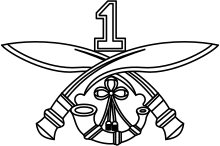| 1 Gorkha Rifles | |
|---|---|
 1 Gorkha Regiment insignia | |
| Active | 1815–present |
| Country | |
| Branch | |
| Type | Rifles |
| Role | Light Role |
| Size | 6 Battalions |
| Regimental Centre | Sabathu, Himachal Pradesh[1] |
| Motto(s) | Kayar Hunu Bhanda Marnu Ramro (Better to die than live like a coward)[2] |
| Colors | Red; faced white 1886, Rifle—Green; faced red |
| March | War Cry: Jai Mahakali Ayo Gorkhali (Hail goddess Kali The Gorkhas are here)[1] |
| Anniversaries | Raising Day (24 April) |
| Engagements | First Anglo-Sikh War Indian Rebellion of 1857 Perak War Second Afghan War Burma North-West Frontier Waziristan (1894) Tirah (1897) First World War Third Afghan War Second World War Indo-Pakistani War of 1965 Indo-Pakistani War of 1971 |
| Decorations | 1 Param Vir Chakra 2 Victoria Cross 7 Maha Vir Chakras 16 Vir Chakras 1 Kirti Chakra 3 Shaurya Chakras 1 Yudh Seva Medal 22 Sena Medals[1] |
| Commanders | |
| Colonel of the Regiment | Lt Gen Sanjeev Chauhan |
| Insignia | |
| Regimental Insignia | A pair of crossed Khukris with the numeral 1 above |
| Tartan | Childers (1st Bn pipe bags and plaids) Mackenzie HLI (2nd Bn pipe bags and plaids) |
1st Gorkha Rifles (The Malaun Regiment), often referred to as the 1st Gorkha Rifles, or 1 GR in abbreviation, is the most senior Gorkha Infantry regiment of the Indian Army, comprising Gurkha soldiers of Indian Gorkha or Nepalese nationality, especially Magars and Gurungs, hill tribes of Nepal. It was originally formed as part of the East India Company's Bengal Army in 1815, later adopting the title of the 1st King George V's Own Gurkha Rifles (The Malaun Regiment), however, in 1947, following the partition of India, it was transferred to the Indian Army and in 1950 when India became a Republic, it was redesignated as 1st Gorkha Rifles (The Malaun Regiment). The regiment has a long history and has participated in many conflicts, including many of the colonial conflicts prior to Indian independence, as well as the First and Second World Wars. Since 1947 the regiment has also participated in a number of campaigns against Pakistan in 1965 and 1971 as well as undertaking peacekeeping duties as part of the United Nations.
- ^ a b c "1 Gorkha Rifles". Bharat Rakshak—Land Forces Site. Archived from the original on 15 August 2009. Retrieved 28 July 2009.
- ^ "1 Gorkha Rifles". The Official Home of the Indian Army. Indian Army. Archived from the original on 19 June 2009. Retrieved 28 July 2009.